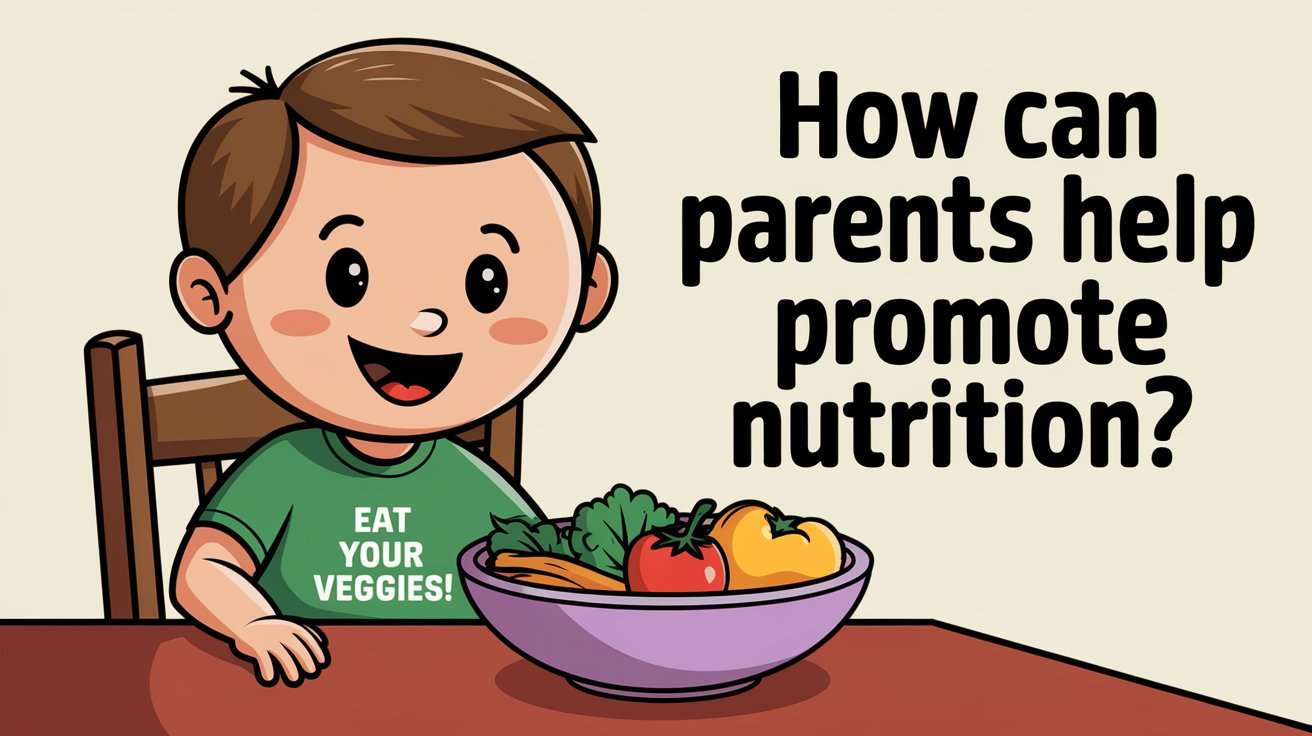Promoting healthy nutrition at home is one of the most important roles parents play in their children’s lives. But how can parents help promote healthy nutrition in a way that is enjoyable and sustainable? From creating a balanced meal plan to teaching kids about the benefits of nutritious foods, there are countless strategies parents can use to build a strong foundation for lifelong healthy eating habits.
This guide will explore 9 smart ways parents can make a difference, ensuring their kids grow up with a positive relationship with food.
How Can Parents Help Promote Healthy Nutrition?

1. Lead by Example
Children often imitate their parents’ behavior, and eating habits are no exception. When you make healthy choices, such as eating fruits, vegetables, and whole grains, your kids are more likely to follow suit.
- Incorporate a variety of colorful foods into your meals.
- Avoid skipping meals or opting for fast food.
- Show enthusiasm for trying new, healthy recipes.
By modeling good eating habits, you can inspire your children to adopt similar behaviors.
2. Create a Balanced Meal Plan
A well-balanced diet is key to healthy growth and development. Ensure that every meal includes:
- Proteins (e.g., beans, lean meat, eggs)
- Whole grains (e.g., brown rice, whole wheat bread)
- Fruits and vegetables
- Dairy or non-dairy alternatives
Planning meals ahead of time helps maintain consistency and reduces the temptation to rely on unhealthy options.
3. Make Mealtimes Enjoyable
Turn mealtime into a pleasant experience to encourage kids to enjoy healthy food. Here’s how:
- Set up a distraction-free environment by turning off TVs and devices.
- Encourage family conversations about the day.
- Present food creatively, such as making fun shapes with vegetables or arranging fruits into a smiley face.
This positive environment makes healthy eating feel less like a chore and more like a fun activity.
4. Offer Healthy Snacks
Snacks are an essential part of a child’s diet, but they should be nutritious. Replace sugary or processed snacks with healthier alternatives:
- Sliced apples with peanut butter
- Yogurt with fresh berries
- Carrot sticks with hummus
- Homemade trail mix with nuts and dried fruits
Providing easy access to healthy snacks encourages better choices.
5. Teach Kids About Nutrition

Help children understand the benefits of nutritious food by making the learning process interactive:
- Use simple explanations, such as “Carrots help your eyes stay strong.”
- Read books or watch videos about healthy eating.
- Let them help with grocery shopping and identify healthy options.
Teaching children the “why” behind healthy eating empowers them to make informed decisions.
6. Involve Kids in Cooking
Getting kids involved in meal preparation sparks their interest in healthy eating. Let them:
- Wash vegetables or fruits
- Stir ingredients in a bowl
- Choose a recipe for dinner
Cooking together not only teaches valuable life skills but also makes them excited about the meals they helped create.
7. Avoid Food as a Reward or Punishment
Using food as a reward or punishment can create an unhealthy relationship with eating. Instead:
- Reward good behavior with activities, like a family game night.
- Avoid forcing children to eat certain foods, which can lead to resistance.
Encourage a balanced approach to food without attaching emotional value.
8. Be Patient with Picky Eaters
Picky eating is common among children, but patience is key:
- Introduce new foods gradually alongside familiar favorites.
- Serve small portions of new foods to avoid overwhelming them.
- Avoid pressuring kids to eat; instead, praise them for trying.
Consistency and gentle encouragement can help broaden their palate over time.
9. Limit Sugary Drinks and Snacks
Sugary foods and beverages can lead to long-term health problems like obesity and tooth decay. Reduce their availability by:
- Offering water or milk as primary drink options.
- Choosing whole fruits instead of fruit juices.
- Limiting treats to occasional events rather than everyday snacks.
This shift encourages children to prefer healthier alternatives.
Healthy Nutrition Strategies and Benefits
| Strategy | Benefit |
|---|---|
| Lead by Example | Encourages children to mimic habits |
| Balanced Meal Planning | Supports growth and development |
| Involving Kids in Cooking | Boosts interest and life skills |
| Teaching About Nutrition | Empowers informed decisions |
| Limiting Sugary Options | Promotes better long-term health |
Related Article: 7 Proven Ways to Encourage Children to Eat Healthy Food
Conclusion
Promoting healthy nutrition at home doesn’t have to be overwhelming. By implementing these nine strategies, parents can create a nurturing environment where children develop healthy eating habits. Whether it’s leading by example, involving kids in cooking, or teaching them about nutrition, each step contributes to a positive relationship with food.
For parents wondering how can parents help promote healthy nutrition, the answer lies in consistent, simple actions that create a lasting impact on their children’s health and well-being.
FAQ’s
How can parents help promote healthy nutrition?
Parents can promote healthy nutrition by setting an example, creating balanced meal plans, and teaching children the benefits of nutritious foods. Involving kids in cooking also helps.
What are healthy eating tips for kids?
Healthy eating tips include offering a variety of colorful foods, limiting sugary snacks, and encouraging regular family meals. Making food fun and interactive also encourages better choices.
How can parents encourage nutritious meals at home?
Parents can encourage nutritious meals by involving kids in meal preparation, offering healthy snacks, and teaching them about the benefits of different foods in an engaging way.
Why is parental involvement important in promoting healthy diets?
Parental involvement sets the foundation for lifelong habits. When parents model healthy behaviors and actively engage in their child’s nutrition, it reinforces the importance of eating well.
How can teaching children good eating habits benefit them?
Teaching good eating habits helps children understand the value of nutrition, reduces picky eating, and fosters a positive attitude toward food that lasts into adulthood.




